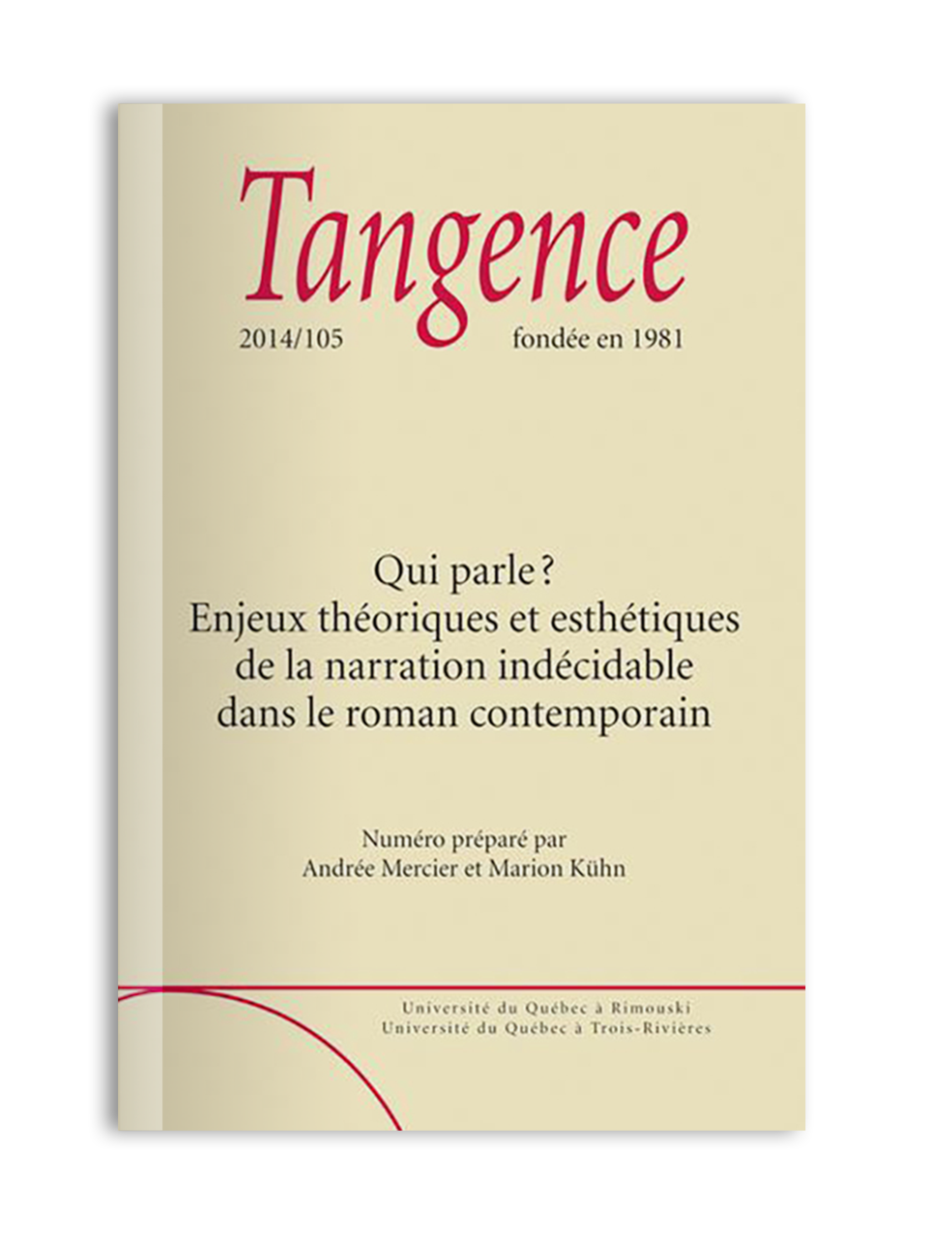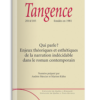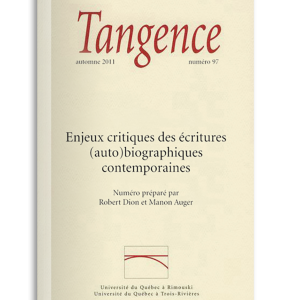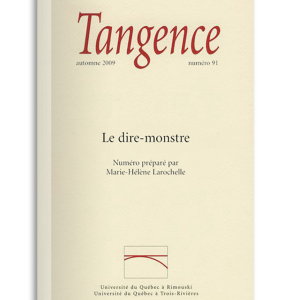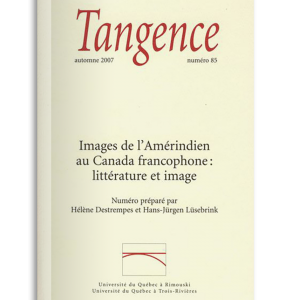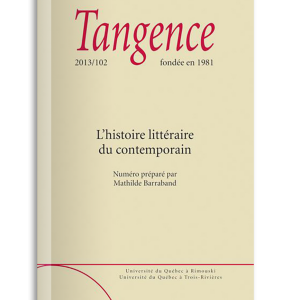N° 105 / 2014
Qui parle ? Enjeux théoriques et esthétiques de la narration indécidable dans le roman contemporain
Patrick Thériault
« Le narrateur se lève » : narration indécidable et fondation illégitime dans Les particules élémentaires de Michel Houellebecq
Le lecteur des Particules élémentaires ne peut qu’être déconcerté par l’apparition, vers la fin du roman et dans le cadre même de la représentation, d’un personnage identifié (au) « narrateur » : « Le narrateur se lève ». En faisant « se lever » ce narrateur-personnage, le texte de Michel Houellebecq soulève une question d’ordre référentiel qu’on ne peut, en toute rigueur, ignorer : qui (quelle instance, quelle voix, quelle figure), en venant comme le dédoubler, s’énonce ainsi à la place du narrateur-personnage ? Le roman n’offre aucune réponse certaine à cette question ; il engramme en cela une forme d’énigme narratologique qu’on peut qualifier d’indécidable. Pour autant, cette énigme n’en est pas moins un index critique et un levier heuristique de première importance, à travers lesquels, comme j’en ferai l’hypothèse, il est possible d’entrapercevoir la richesse épistémologique des Particules élémentaires. De manière plus précise, je m’attacherai à montrer comment, en posant la question du métalangage et en confinant en dernière analyse à ce que Jean-François Lyotard appelle l’« aporie logique de l’autorisation », cette énigme narratologique fait dialoguer le roman de Houellebecq avec le discours philosophique sur la postmodernité et la fin de l’Histoire.
« The narrator stands » : undecidable narration and illegitimate foundation in Michel Houellebecq’s novel The Elementary Particles
The reader of the The Elementary Particles can only be disconcerted by the appearance, towards the end of the novel and within the very context of the representation, of a character identified as (to the) « narrator » : « The narrator stands« . By having this narrator-character « stand », Michel Houellebecq’s text raises a question of a referential nature that cannot, strictly speaking, be ignored : who (what instance, what voice, what figure), through a kind of doubling, thereby expresses itself in place of the narrator-character ? The novel offers no certain answer to this question insofar as it engrams a form of narratological enigma that can be qualified as undecidable. However, this enigma is nevertheless a critical sign and a heuristic lever of primary importance through which, as I hypothesize, the epistemological wealth of The Elementary Particles can be glimpsed. More specifically, by raising the issue of metalanguage and confining it in the final analysis to what Jean-François Lyotard calls the « logical aporia of authorization », I will attempt to show how this narratological enigma creates a dialogue between Houellebecq’s novel and the philosophical discourse on postmodernism and the end of History.
***
Marion Kühn
Des voix du silence. Variations de la narration indécidable dans le roman de mémoire contemporain (Judy Quinn, Marcel Beyer et Laurent Mauvignier)
Par la mise en scène de la fiabilité problématique de tentatives d’appropriation du passé, le roman de mémoire interroge souvent la subjectivité et la sélectivité de la mémoire. Présentant trois variations de la narration indécidable, l’article vise à démontrer l’apport supplémentaire de cette forme de narration problématique à la réflexion sur la mémoire par la fiction, notamment sur la formation collective de la mémoire individuelle. Pour ce faire, l’article analyse trois romans de mémoire québécois, allemand et français publiés après 2000, et qui exploitent de différentes manières le contraste entre voix narratives individualisées et voix narratives dont l’attribution pose problème. Ce faisant, Hunter s’est laissé couler de Judy Quinn, Spione de Marcel Beyer et Des hommes de Laurent Mauvignier suscitent des questions sur la mise en récit d’une mémoire passée sous silence. Si Hunter s’est laissé couler interroge surtout les enjeux de la mise en fiction d’une vie quasi inconnue, Spionese penche sur le vide mémoriel et identitaire que provoque un passé tu chez ceux qui viennent après. Quant au roman Des hommes, il repose sur la mise en récit paradoxale d’un passé indicible qui occasionne le silence auquel se heurtent les personnages des romans de Quinn et de Beyer.
Some voices of silence. Variations of undecidable narration in the contemporary memoir-novel (Judy Quinn, Marcel Beyer and Laurent Mauvignier)
By using a mise en scène of the problematic reliability of attempts to appropriate the past, the memoir-novel often explores the memoir’s subjectivity and selectivity. By presenting three variations of undecidable narration, the present article aims to demonstrate how this form of problematic narration further contributes to fiction’s reflection on the memoir, notably on the collective formation of the individual memoir. Toward this end, the article analyzes three Quebec, German and French memoir-novels published after 2000 that exploit in different ways the contrast between individualized narrative voices and narrative voices of problematic attribution. Accordingly, Hunter s’est laissé couler by Judy Quinn, Spione by Marcel Beyer and Des hommes by Laurent Mauvignier raise questions about the narrative creation of a memoir that has gone ignored. If Hunter s’est laissé couler focuses, mainly, on the issues involved in fictionalizing a quasi-unknown life, Spione examines the memory and identitary void produced by the past in those who come after. The novel Des hommes, for its part, is based on the paradoxical narrative creation of an unspeakable past that is responsible for the silence confronted by the characters in Quinn’s and Beyer’s novels.
***
Alice Richir
Hétérogénéisation de l’énonciation dans l’œuvre de Tanguy Viel
La question « qui parle ? » dans les romans de Tanguy Viel a tendance à être éludée par l’identification d’un narrateur homodiégétique qui est, de surcroît, le personnage principal de l’histoire. Cette réponse spontanée ne résiste toutefois pas à une lecture plus attentive de l’œuvre de cet auteur. Chez Viel, l’énonciation n’est jamais transparente, l’identification jamais unilatérale. Toute tentative pour déterminer l’identité de l’instance en charge de la narration met bien vite au jour les traces linguistiques d’une présence subjective autre que celle du narrateur identifié. En effet, l’univocité de la voix narrative est rapidement mise en doute par le caractère indéterminé du narrateur qui l’assume, ainsi que par le fait que la parole de celui-ci est constamment hantée par d’autres voix dont l’origine demeure incertaine. Il s’agira dans cet article de déplier progressivement cette question de l’attribution de la narration, en commençant par interroger la nature de la figure en charge de celle-ci pour, ensuite, identifier les procédés déployés au service d’une telle entreprise de subversion de la mise en récit.
Heterogenization and enunciation in the works of Tanguy Viel
The question of « who is speaking ? » in the novels of Tanguy Viel tends to be avoided by the identification of a homodiegetic narrator who is, furthermore, the story’s protagonist. This spontaneous answer, however, does not stand up to a more careful reading of this author’s work. In Viel, enunciation is never transparent, identification never unilateral. Every attempt to determine the identity of the authority very quickly uncovers the linguistic traces of a subjective presence other than that of the narrator identified. Indeed, the univocity of the narrative voice is quickly called into question owing to the indeterminate character of the narrator who assumes it, and because the latter’s voice is continually haunted by other voices of uncertain origin. This article aims to explore progressively this issue of attribution of narration, beginning by examining the nature of the figure in charge and then identifying the processes deployed in an undertaking of this kind to subvert narrative creation.
***
Anne Élaine Cliche
« Une voix en moi, pas la mienne »
Cet article propose de passer par l’indécidable de la voix du point de vue « prophétique », qui ne concerne pas tant l’identité que le lieu de surgissement du dire, pour penser les enjeux de cette transcendance dans l’écriture romanesque contemporaine. Les prophètes bibliques ont eux-mêmes interrogé cette vocation qui leur tombe dessus comme une charge, un fardeau, et les destine à « parler une parole » dont la provenance, le lieu, reste éminemment énigmatique et dialogique. Ce qui nous intéresse plus précisément ici, ce sont les écrivains pour qui la voix d’écriture — voix narrative — fait question, ne passe pas directement, ne se donne pas comme pure et simple extension (expression) d’un moi, même fictif. On se tournera donc volontiers vers ceux chez qui la voix frappe l’obstacle qu’elle doit pourtant traverser, et de là, révèle que la source — source de la voix — n’est pas adéquate au corps (celui du narrateur par exemple) qui apparemment la profère. Cette mise en jeu de l’inadéquation entre la voix et le corps parlant permet d’éclairer certaines « narrations indécidables ». De là, on pourra revoir l’énonciation de deux romans (Comment c’est de Samuel Beckett et Des anges mineurs d’Antoine Volodine) dans ce qu’elle suscite de révélation qui lui permet de soutenir que la narration ne saurait être une simple mise en récit. Elle serait surtout, cette narration, la création d’un réel inédit qui n’est pas l’histoire racontée mais l’événement d’une voix.
« A voice in me, not mine »
This article proposes to discuss the undecidable of voice from the « prophetic » point of view — concerned less with identity and more with the emergence of speech — in order to reflect on the issues relative to this transcendence in contemporary fiction. The biblical prophets themselves questioned this calling, which fell on them as a responsibility, a burden, and destined them to « speak a word » whose provenance, whose place, remained eminently enigmatic and dialogic. Of specific interest to us here are the writers for whom the writer’s voice — narrative voice — is in question, does not come through directly, does not appear as a pure and simple extension (expression) of an I, even a fictional I. We then turn willingly to those whose voice encounters an obstacle it must nonetheless overcome, and hence reveals that the source — source of the voice — is inadequate to the body (that of the narrator for example) who apparently expresses it. This inadequacy between the voice and the speaking body makes it possible to clarify certain « undecidable narrations. » Hence, we can review the enunciation in two novels (How It Is by Samuel Beckett and Minor Angels by Antoine Volodine) regarding what that enunciation reveals to indicate that the narration cannot be a mere narrative creation. This narration would be, above all, the creation of a new reality, one that is not the story recounted but the event of a voice.
***
Francis Langevin
Genre, géographie et héritage : lecture éthique du style du narrateur dans L’annonce de Marie-Hélène Lafon
Cet article propose une lecture du roman L’annonce (2009) de Marie-Hélène Lafon et illustre un parcours qui va du style vers l’individualité et l’intentionnalité, afin de montrer une partie de l’activité interprétative à laquelle donne lieu une indécidabilité quant à la source (pragmatique) du style de la narration, des évaluations et, partant, des valeurs. Il présente pour ce faire un état des lieux critique entre la construction énonciative des valeurs (Hamon, Korthals Altes, Jouve) et la construction énonciative du point de vue (Rabatel). Il affirme en outre que la lecture ne se satisfait que momentanément de l’indécidabilité quand il est nécessaire d’attribuer des valeurs, et que ce mode de lecture est aussi sensible aux positions énonciatives qu’aux positions éthiques que lui propose le texte. Plus précisément, l’auteur s’intéresse aux effets éthiques du style et observe comment se construisent des ponts entre le style, garantie de littérarité, et l’idéologie, référent extratextuel. Dans le roman L’annonce, ce sont en particulier le genre sexuel, l’origine géographique et l’héritage paysan qui semblent être l’enjeu des évaluations et du style de la narration.
Genre, geography and heritage : an ethical reading of the narrator’s style in L’annonce by Marie-Hélène Lafon
This article proposes a reading of the novel L’annonce (2009) by Marie-Hélène Lafon and illustrates a path that goes from style to individuality and intentionality in order to show part of the interpretative activity produced by an undecidability regarding the source (pragmatic) of the style of the narration, of the evaluations and, hence, of the values. To this end, the article presents a critical inventory between the enunciative construction of values (Hamon, Korthals Altes, Jouve) and the enunciative construction of point of view (Rabatel). It maintains, moreover, that a reading is only momentarily satisfied by undecidability when values must be attributed, and that this mode of reading is as sensitive to enunciative positions as to the ethical positions the text proposes. More specifically, the author examines the ethical effects of the style and observes how bridges are constructed between style, guarantee of literarity, and ideology, extratextual referent. In the novel L’annonce, sexual genre, geographic origin and peasant heritage are the particular focuses of the evaluations and narrative style.
***
Alain Farah
Un piratage énonciatif signé La Rédaction ? Le cas Valérie par Valérie (2008)
L’ouvrage Valérie par Valérie paraît en 2008 aux éditions Al Dante/Questions théoriques. Il porte la signature de La Rédaction, collectif dont la paternité est attribuée à Christophe Hanna. Ce livre contient le témoignage d’une ancienne figure de la téléréalité, phagocyté par la parole, le ton et les préoccupations d’un « nègre ». À travers cette narration indécidable se dévoilent les rouages d’un procédé de piratage de l’écriture, en même temps qu’émerge une mise en question du statut d’auteur, voire de l’acte créateur lui-même. Présentant l’écrivain comme un rédacteur, et l’écriture comme un agencement de fragments glanés au fil de ponctions et de vols, Valérie par Valérie actualise ainsi l’attaque dirigée par Isidore Ducasse contre la fétichisation de la signature auctoriale.
An enunciative pirating signed La Rédaction ? The case of Valérie par Valérie (2008)
The work Valérie par Valérie was published in 2008 by Les éditions Al Dante/Questions théoriques. It bore the signature of La Rédaction, a collective established by Christophe Hanna. This book contains the testimony of a former character from reality TV who has assumed the speech, tone and concerns of a « ghostwriter. » This undecidable narration highlights the workings of the process of piracy in writing and, at the same time, questions the author’s status, even the creative act itself. Presenting the writer as a redactor, and writing as an arrangement of fragments culled from borrowings and thefts, Valérie par Valérie thus actualizes Isidore Ducasse’s attack against the fetishization of the actuarial signature.
***
David Bélanger et Cassie Bérard
Ces récits autogénérés : stratégies paratextuelles pour un brouillage de l’origine
Différentes conventions régissent ce qu’on nomme le « topique du manuscrit trouvé ». Bien présent dans la littérature des XVIIe et XVIIIe siècles, ce topique sert à pallier certaines invraisemblances, à lier, de façon plus ou moins sérieuse, le texte fictionnel à l’univers référentiel. Or, ce phénomène, intégré dans des romans du XXIesiècle, ne saurait viser les mêmes effets. Cet article se propose d’analyser la présence de ce topique dans des œuvres contemporaines, en s’attardant plus particulièrement aux « préfaces dénégatives » qui servent à réfuter l’identité de l’auteur institutionnel — celui dont le nom paraît sur la jaquette — en proposant une origine nouvelle au texte. Si l’étude de quelques romans aux stratégies paratextuelles distinctes (La chambre de Simon Lambert, Maleficium de Martine Desjardins et Une estafette chez Artaud de Nicolas Tremblay) permet d’établir les enjeux d’une telle pratique, l’article s’attarde plus particulièrement sur des cas limites qui actualisent de façon inusitée le topique du manuscrit trouvé : Wigrum de Daniel Canty, d’une part, et Éros mélancolique de Jacques Roubaud et Anne F. Garréta, d’autre part. De la question première, « à quoi cela sert-il ? », découle une hypothèse, à savoir, le déplacement de l’enjeu du vraisemblable, qui concernerait moins la question du croire, dans ces œuvres, que la question de l’origine.
These self-generated narratives : paratextual strategies for blurring the origin
Various conventions govern what has been termed the « device of the found manuscript. » A common feature of seventeenth and eighteenth century literature, this device serves to compensate for certain implausibilities, to link, more or less seriously, the fictional text with the referential universe. Now, this phenomenon, when integrated into the novels of the nineteenth century, could not aim for the same effects. The present article proposes to analyze the presence of this device in contemporary works by examining, more specifically, the « prefaces of denial » that serve to refute the identity of the institutional author — the person whose name appears on the jacket — and by suggesting a new origin for the text. If the study of some novels employing distinct paratextual strategies (La chambre by Simon Lambert, Maleficium by Martine Desjardins and Une estafette chez Artaud by Nicolas Tremblay) allows us to establish the issues involved in a practice of this kind, the present article focuses, more particularly, on those borderline cases that actualize the device of the found manuscript in an unusual way : Wigrum by Daniel Canty, on one hand, and Éros mélancolique by Jacques Roubaud and Anne F. Garréta, on the other. The proposed answer to the first question that arises, « What purpose does it serve ? », involves the shift in the issue of the plausible, which in these works is less about belief than about origin.

